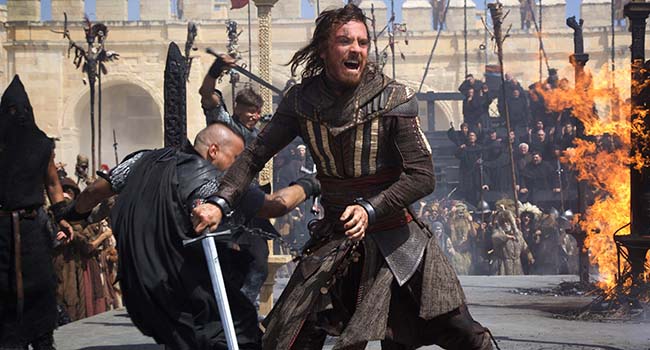“Nothing is true. Everything is permitted.”
This is the assassins’ creed, the motto of the popular “Assassin’s Creed” video game series on which this movie is based. I have to disagree with the creed though, for I know one thing to be true: “Assassin’s Creed” is the best video game movie ever made. However, in a world where atrocious video game movies are permitted, that’s not saying much.
Only a fool would attempt to explain the mythology of the games in a short review. There is a massive amount of ground to cover narratively, and that is from where the screenplay’s issues stem. But when “Assassin’s Creed” takes a break from its rushed storytelling, it features magnificent historical action.
“Assassin’s Creed” was shaped by a group of filmmakers with experience in the realm of historical drama. On the plus side, Director Justin Kurzel and one of the three writers made last year’s “Macbeth”, an epic adaption of the classic Shakespearean tragedy. On the negative side, the other two writers made 2014’s “Exodus: Gods and Kings”, a tacky mess of biblical proportions.
The differing styles of these filmmakers are felt strongly. “Assassin’s Creed”, like the games, is split up between two stories: the adventures of an assassin in the past, and the scientific efforts of evil Templars in the present accessing these adventures through a machine that unlocks ‘genetic memory’. A common complaint with the video games concerned their tedious modern day segments conflicting with far more entertaining escapades in the past, and thanks to the contrary styles of the filmmaking team, this problem carries over to the film intact.
Director Justin Kurzel’s touch turns every scene in 15th century Spain to gold. He is exquisitely adept at bringing history to life, which was one of the game series’ biggest strengths and now the film’s ultimate crowd-pleaser.
As the Assassin Order fights against the religious rule enacted by the Spanish Inquisition, Kurzel and cinematographer Adam Arkapaw craft intensely choreographed fights and thrilling chases. The depiction of Spanish locales is breathtaking: backdrops swell with sweeping grandiosity as the visual artists play with light and shadow to emphasize the story’s battle.
That battle is the centuries-long struggle between Assassins fighting for freedom and Templars clawing for control. While the games allowed countless hours and player-controlled opportunities to explore the grey areas of this war, “Assassin’s Creed” the movie deals strictly in shades of black and white. And ridiculousness.
The premise’s execution in the modern day comes off as overly silly when crammed into a movie’s runtime. The screenwriters could not successfully mesh wannabe-Nolan bleakness with tales of ancient artifacts that control free will and hood-wearing parkour murderers. The scenes that take place in 2016 are little more than exposition machines spouting sci-fi terms at an unintelligible rate. The only reason I could follow the plot is because I grew up playing the games — many moviegoers will be easily lost.
Because so much time is dedicated to delving into convoluted terms from the games, there are no moments left to pay attention to character. “Assassin’s Creed” unceremoniously wastes an immensely talented cast — Michael Fassbender, Marion Cotillard, Brendan Gleeson and Charlotte Rampling to name a few legends — on characters that leave zero impression. Not even their names or goals are memorable — just what sides they were on.
Your mileage with “Assassin’s Creed” will vary. If you’re a fan of the game series, there are multiple references to catch and this adaption is fairly faithful. If not, action buffs and history buffs alike will love half the film.
★★½ (2.5 out of 5)




